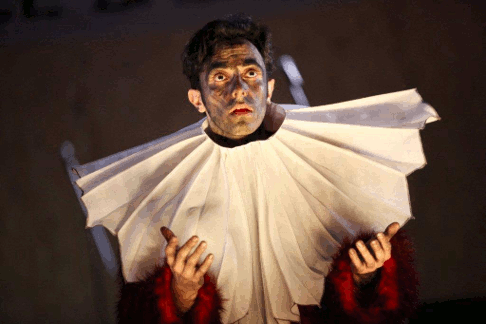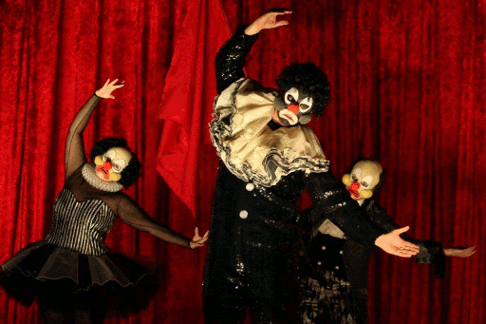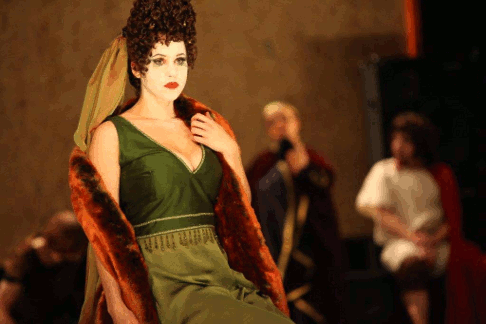![Camilla de Falleiro (Gianisbe) and guest [Photo courtesy of Theater Heidelberg]](http://www.operatoday.com/Spartakus01.png)
04 Feb 2010
Heidelberg’s Stumbling Spartaco at Schwetzingen Castle
For those who might be seeking a representational tale of the legendary Roman slave Spartacus, well, Gladiator this ain’t.
English Touring Opera are delighted to announce a season of lyric monodramas to tour nationally from October to December. The season features music for solo singer and piano by Argento, Britten, Tippett and Shostakovich with a bold and inventive approach to making opera during social distancing.
This tenth of ten Live from London concerts was in fact a recorded live performance from California. It was no less enjoyable for that, and it was also uplifting to learn that this wasn’t in fact the ‘last’ LfL event that we will be able to enjoy, courtesy of VOCES8 and their fellow vocal ensembles (more below …).
Ever since Wigmore Hall announced their superb series of autumn concerts, all streamed live and available free of charge, I’d been looking forward to this song recital by Ian Bostridge and Imogen Cooper.
The Sixteen continues its exploration of Henry Purcell’s Welcome Songs for Charles II. As with Robert King’s pioneering Purcell series begun over thirty years ago for Hyperion, Harry Christophers is recording two Welcome Songs per disc.
Although Stile Antico’s programme article for their Live from London recital introduced their selection from the many treasures of the English Renaissance in the context of the theological debates and upheavals of the Tudor and Elizabethan years, their performance was more evocative of private chamber music than of public liturgy.
In February this year, Albanian soprano Ermonela Jaho made a highly lauded debut recital at Wigmore Hall - a concert which both celebrated Opera Rara’s 50th anniversary and honoured the career of the Italian soprano Rosina Storchio (1872-1945), the star of verismo who created the title roles in Leoncavallo’s La bohème and Zazà, Mascagni’s Lodoletta and Puccini’s Madama Butterfly.
Evidently, face masks don’t stifle appreciative “Bravo!”s. And, reducing audience numbers doesn’t lower the volume of such acclamations. For, the audience at Wigmore Hall gave soprano Elizabeth Llewellyn and pianist Simon Lepper a greatly deserved warm reception and hearty response following this lunchtime recital of late-Romantic song.
Collapsology. Or, perhaps we should use the French word ‘Collapsologie’ because this is a transdisciplinary idea pretty much advocated by a series of French theorists - and apparently, mostly French theorists. It in essence focuses on the imminent collapse of modern society and all its layers - a series of escalating crises on a global scale: environmental, economic, geopolitical, governmental; the list is extensive.
For this week’s Live from London vocal recital we moved from the home of VOCES8, St Anne and St Agnes in the City of London, to Kings Place, where The Sixteen - who have been associate artists at the venue for some time - presented a programme of music and words bound together by the theme of ‘reflection’.
'Such is your divine Disposation that both you excellently understand, and royally entertaine the Exercise of Musicke.’
Amongst an avalanche of new Mahler recordings appearing at the moment (Das Lied von der Erde seems to be the most favoured, with three) this 1991 Mahler Second from the 2nd Kassel MahlerFest is one of the more interesting releases.
‘And there was war in heaven: Michael and his angels fought against the dragon; and the dragon fought and his angels, And prevailed not; neither was their place found any more in heaven … that old serpent … Satan, which deceiveth the whole world: he was cast out into the earth, and his angels were cast out with him.’
If there is one myth, it seems believed by some people today, that probably needs shattering it is that post-war recordings or performances of Wagner operas were always of exceptional quality. This 1949 Hamburg Tristan und Isolde is one of those recordings - though quite who is to blame for its many problems takes quite some unearthing.
There was never any doubt that the fifth of the twelve Met Stars Live in Concert broadcasts was going to be a palpably intense and vivid event, as well as a musically stunning and theatrically enervating experience.
‘Love’ was the theme for this Live from London performance by Apollo5. Given the complexity and diversity of that human emotion, and Apollo5’s reputation for versatility and diverse repertoire, ranging from Renaissance choral music to jazz, from contemporary classical works to popular song, it was no surprise that their programme spanned 500 years and several musical styles.
The Academy of St Martin in the Fields have titled their autumn series of eight concerts - which are taking place at 5pm and 7.30pm on two Saturdays each month at their home venue in Trafalgar Square, and being filmed for streaming the following Thursday - ‘re:connect’.
The London Symphony Orchestra opened their Autumn 2020 season with a homage to Oliver Knussen, who died at the age of 66 in July 2018. The programme traced a national musical lineage through the twentieth century, from Britten to Knussen, on to Mark-Anthony Turnage, and entwining the LSO and Rattle too.
With the Live from London digital vocal festival entering the second half of the series, the festival’s host, VOCES8, returned to their home at St Annes and St Agnes in the City of London to present a sequence of ‘Choral Dances’ - vocal music inspired by dance, embracing diverse genres from the Renaissance madrigal to swing jazz.
Just a few unison string wriggles from the opening of Mozart’s overture to Le nozze di Figaro are enough to make any opera-lover perch on the edge of their seat, in excited anticipation of the drama in music to come, so there could be no other curtain-raiser for this Gala Concert at the Royal Opera House, the latest instalment from ‘their House’ to ‘our houses’.
"Before the ending of the day, creator of all things, we pray that, with your accustomed mercy, you may watch over us."
![Camilla de Falleiro (Gianisbe) and guest [Photo courtesy of Theater Heidelberg]](http://www.operatoday.com/Spartakus01.png)
For those who might be seeking a representational tale of the legendary Roman slave Spartacus, well, Gladiator this ain’t.
The industrious Heidelberg City Theater is to be commended for excavating this early 18th century curiosity, composed by Giuseppe Porsile in 1726 for the Emperor’s Carnival celebration in Vienna. After considerable popular success, Spartaco (perhaps unfairly) disappeared. But just like Evita’s body, or a bad penny, it has now re-surfaced, alas tarted up in a mounting that aspires to be moralizing, scolding, Shabby-Chic but which only manages to succeed with the pre-hyphen portion of that label.
Happily, this performance lacks for nothing musically as it is exceedingly well sung and played. The period band assembled from the ranks of the Philharmonic Orchestra of the City of Heidelberg augmented by Baroque specialists gave great pleasure and offered variety and consistency in equal measure under the propulsive baton of Michael Form. There were especially fine contributions by Julian Behr (theorbo) and Marc Meisel (continuo). At the very end of the evening, a sudden welcome addition appeared with a brilliantly accurate piccolo trumpet solo by Laura Vukobratovic. Maestro Form seemed in good sync with his talented singers and instrumentalists and they collaborated to fine effect.
Perhaps the very recent financial scare that threatened to actually shut down the Stadttheater looms over the operation still. How else to explain the junk pile approach to the overall set “design”? I am not bothered by seeing an unadorned stage with all the rigging and escape doors in full view. But I take issue with the deliberate ugliness of all the motley, disparate, and worn out pieces that clutter that playing area. Well, it is not quite completely bare since a large projection screen dominates the upstage playing space fronted by a platform, and (uh-oh) contemporary microphones on stands (be afraid, be very afraid). The tawdry props and dressing seem to have been collected from the curbside, one step ahead of the garbage trucks on bulk trash pick-up day.
Ben Baur is not only on the blame line for this scenic hodge-podge, but also for devising the costumes. Drawing on the opera’s Carnival associations, he has attired most of the cast in what seem to be homemade costumes such as people without taste might throw together in an attempt to be “wild and crazy.” You know, you’ve seen them. They are of the ilk of pulling patterned underwear over outerwear, painting on freckles with mom’s mascara, and wearing Doc Martins with a tutu. While I made that up, none of it would have been out of place here or any less meaningful. Young Mr. Baur has some wonderful credits to his name, and it has to be said that Vetturia’s historical gown, wig, and crown were fetching. And even the clowns (yes, clowns, God-help-us) were visually arresting. Would that the rest of the cast had been treated to as much consideration, for their characterizations were not helped by their “look.”
Perhaps all of this could have had more impact had it been compellingly lit, but with no lighting designer even credited, the unimaginative wash and clumsy area lighting effects contributed nothing to the staging. Perhaps the Rococo Theatre has severe technical limitations? Although I did not much enjoy the content of Stefan Butzmühlen’s videos (or even see the need for them) they were in fact very professionally created. Highlighting just one of the movies, screened over ballet music: rowdy clowns have a take-no-prisoners cream pie fight. Yep, Bozo is up there hurling those pastries hither and yon, while the plot stops. Oh, and then two of the film actors force feed a piece of pie to a down-and-out street person crashed on the sidewalk in front of their house.
 Emilio Pons as Spartaco
Emilio Pons as Spartaco
The responsibility for this clutter must be laid at the feet of stage director Michael von zur Mühlen. Apparently borrowing from the titular hero’s slave status, there is a concept at work that decries oppression and slavery (and well, who can disagree with that, hmm?). But Herr v.z. Mühlen is not content to play the opera straight to make his point, but grafts on amplified shrill prose diatribes, made up out of whole cloth, shouted by three extraneous clowns. Part Stephen King’s evil It, part Clarabelle with a wireless mike, part Emmet Kelly in need of a distemper shot, actors Judith Achner, Alisabeth Schlicksupp, and Richard Hoppart strive to be ominous and creepy, but wind up being strident and irrelevant. In addition to these scripted ‘improvements’ to Posile’s opera, we are also subjected to the insertion of the rock recording “Wake Up” by Rage Against the Machine. Oh, and the cast passes the text around a dinner table and reads the lyrics to the finale instead of actually singing the concerted number. There are at least 25 minutes of additional, extra-musical material/scenarios dragging down the show’s considerable musical values.
Mr. Director, sir, there is a fine line between “shock” and “schlock.”
Which leads me to posit the question: If you don’t trust the inherent quality or message of the material, why bother? Why not make up something wholly new? Why subvert someone else’s hard work? This is facile, feckless, free-loading pretense, and it serves neither the talented performers nor the audience, as evidenced by the number of empty seats that only increased after intermission. But… may I return to praising the truly gifted performers?
 The Clowns
The Clowns
In the title role, young tenor Emlio Pons revealed a highly appealing lyric voice, good stylistic acumen, and meticulous passage work in the fierier outbursts. His pleasing instrument goes easily above the staff, and he acts affectingly with the voice without ever sacrificing sound technique. On the “short” side of “tall” he nevertheless commands the stage with an easy, natural presence. Even when he is asked to do un-natural or insulting things. Like stand on an upended beer case to raise him above the height of his female co-stars. Or like taking off his clothes for all of Act Two.
That’s right, in his first aria at the top of Two, Emilio strips off every stitch of his Home-Made-Fasching-Faux-Centurion gear and plays the entire second act in the altogether like a nudist in search of a camp. Eye candy it decidedly may have been, but can you imagine Domingo submitting to this? (Would you want to???) Adding to the mutual discomfort, Mr. Pons eventually toted on two white plastic buckets and then proceeded to slather his body with…what? Mud? War paint? Godiva chocolate sauce? Eventually, his face was crudely got up like Al Jolson about to address Mr. Interlocutor, and he donned a clown ruff, paper Bart-Simpson-hair-do crown, and furry red overcoat meant to suggest a royal robe. But the dang fur-piece persisted in flapping inelegantly, contributing yet another distracting effect of Penis Peek-a-Boo. I am not sure that an artist this fine has ever been made to be so audaciously displayed.
Camilla de Falleiro was a bewitching stage creature as a love-lorn Gianisbe. This charismatic soprano contributed spot-on singing all night and conquered the high-flying challenges of her multiple arias with aplomb, offering crystal clear tone, beauty of sound, rapid fire coloratura, and warmth of personality. This was top-quality vocalism. Yosemeh Adjei has a very distinctive counter-tenor, his well-schooled treble laced with real bite and snap. He runs the risk of verging on edginess, but this is an exciting instrument. And he is a lively stage creature, filling his scenes with agile activity. He also got to show off his gym bunny torso in a square-off duel with the Popilius of Franz Vitzthum, another exceptional counter-tenor who commands a flexible range, creamy rich tone, and stylish phrasing.
 Annika Ritlewski as Vetturia
Annika Ritlewski as Vetturia
Annika Ritlewski scored all of Vetturia’s musical points with her ample, womanly soprano, and provided even singing at both extremes of the range. Mariale Lichdi treated us to some bravura moments, and her pleasant timbre and assured technique were surely appreciated. Too bad Ms. Lichdi was hindered by being the director’s “symbol,” or rather two of them, impersonating first Rosa Luxemburg and then (no kidding) Ulrike Meinhof (yes, of the Red Faction Baader-Meinhof Gang). While baritone Sebastian Geyer was indisposed, he animatedly acted the role of Trasone while Lisandro Abadies provided richly detailed singing from the pit.
What of the piece itself? The production certainly short-changed us in making an informed decision, but there were many attractive set pieces that were beautifully rendered. There seems to be considerably more pleasure to be mined from Pisole’s Spartaco. I certainly would welcome the chance to experience another production of it, shorn of all the pseudo-socialist, politically provocative associations that have weighted down this clumsy rendition.
Halfway through Act Two, handbills rained down on us from the top tier that read: “We don’t want a piece of cake, we want the whole bakery.”
With the “whole bakery” thrown randomly on stage, including the kitchen sink, far too little time was spent savoring the one succulent piece of Kuchen that might have been the composer’s Spartaco.